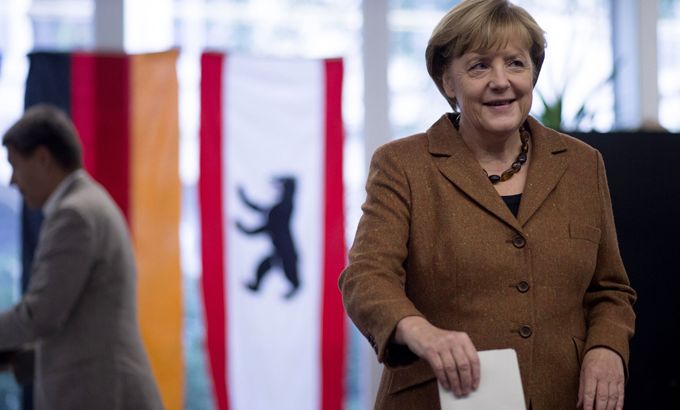Merkel’s conservatives win German vote
Chancellor wins third term, but will have to seek new coalition after her centre-right allies crash out of parliament.

Official results confirm that Chancellor Angela Merkel’s conservatives have won Germany’s election, but indicate that they have finished short of an absolute majority.
Merkel’s Christian Democratic Union (CDU) and its Bavarian sister party together won 41.5 percent of the vote, while its junior coalition allies the pro-business Free Democrats (FDP) for the first time in over half a century missed out on any seats in parliament, garnering only 4.8 percent.
Challenger Peer Steinbrueck’s Social Democrats won 25.7 percent, their Green allies 8.4 percent and the hard-line Left Party 8.6 percent.
Election officials didn’t immediately provide a seat tally, but Merkel’s conservatives are 1.2 percentage points behind the other parties combined.
Merkel, Germany’s chancellor since 2005 and the de facto leader of Europe’s crisis response, told supporters it was “a super result.” She wouldn’t immediately speculate about the shape of the next government, but made clear she plans to serve a full term.
“I see the next four years in front of me and I can promise that we will face many tasks, at home, in Europe and in the world,” Merkel said during a television appearance with other party leaders.
‘A grand coalition’
Despite the scale of her win, governing isn’t likely to get easier for Merkel over the next four years.
Her partners of choice, the pro-business Free Democrats, fell short of the 5 percent needed to win seats in parliament for the first time in Germany’s post-World War II history.
Merkel looks likely to end up leading a coalition government with the Social Democrats. “It seems like both parties know that they have to form a grand coalition,” Dr Marcel Lewandowsky, a political scientist at the Helmut Schmidt University of Hamburg, told Al Jazeera. “It even seems like the SPD had made peace with that.”
Since the last elections in 2009, Germany has witnessed steadily falling unemployment and a strong economy, compared to the woes of its eurozone neighbours.
But Steinbruck had criticised Merkel’s government for failing to stem inequality and taking an overly harsh approach towards indebted eurozone countries.
“The ball is in Merkel’s court,” said Steinbrueck, a former finance minister under Merkel who has said he won’t serve under her again, on Monday night. “She has to get herself a majority.”
Although anecdotal evidence suggested strong voter participation – officials at two polling stations said turnout was higher than in 2009 – Sunday’s election seemed to be a low-energy affair. Aside from the ubiquitous election posters, few visual cues suggested that this was a special day.
Many voters complained that few real differences separated Germany’s major parties.
With additional reporting by Al Jazeera’s Sam Bollier in Berlin